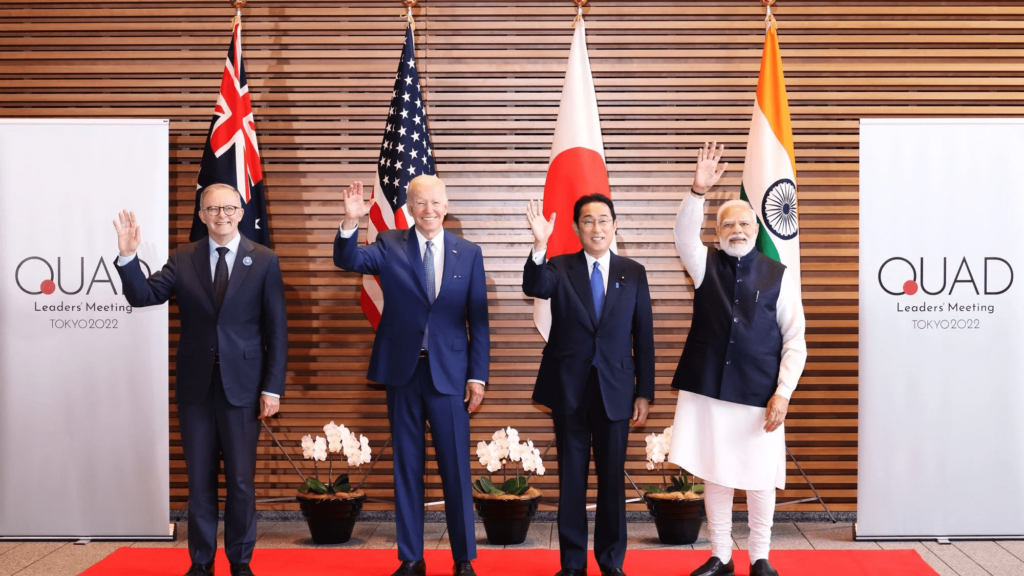About the Author: Muhammad Zubair is a potentially vibrant and active student of BS International Relations at the Department of Politics & IR, University of Sargodha.
India’s participation in the Quadrilateral Security Dialogue, or “Quad,” has become essential to its foreign policy and strategic planning. The Indo-Pacific area is witnessing a growing recognition of the Quad, which consists of Australia, Japan, the United States, and India. This is because of their shared aspiration to maintain an open, inclusive, and accessible region in the face of escalating geopolitical tensions, especially in light of China’s assertive actions.
India’s involvement in the Quad reflects its larger strategic goals, which include balancing China’s increasing influence, protecting its maritime interests, and improving regional connectivity. Driven by similar worries over China’s rising footprint in the South China Sea and its Belt and Road Initiative, which many view as a strategic maneuver to strengthen its geopolitical power, the Quad’s informal origins in 2007 grew into a more formalized form of collaboration by 2017.
It is impossible to exaggerate India’s strategic significance in the Quad. Due to its strategic location in the Indian Ocean, India plays a major role in maintaining the stability and security of important sea routes vital to international trade. India’s maritime prowess and strategic alliances with other Quad members augment the group’s capacity to carry out cooperative military drills, exchange intelligence, and formulate synchronized reactions to nearby threats.
India gains economically from the Quad’s emphasis on creating robust supply chains, especially in vital industries like technology and pharmaceuticals. The Quad’s actions aim to diversify and secure global supply chains, which were made vulnerable by the COVID-19 pandemic. This corresponds to India’s domestic objectives of industrial development and self-reliance by creating chances for economic growth and technological improvement.
India’s participation in the Quad bolsters its standing as a prominent regional actor and advocate of multilateralism from a political standpoint. It emphasizes India’s dedication to an international system based on rules and its readiness to work with other like-minded democracies to defend these standards and ideals. India benefits strategically from this alignment with the Quad and from using its ties to the US, Japan, and Australia to obtain support and advantages in several international fora.
The Quad’s strategic importance spans more than just current security threats; it also includes more general challenges like infrastructure development, cyber security, and climate change. India’s proactive approach to these challenges within the Quad framework highlights its comprehensive strategy for promoting regional peace and development. India increases its soft power and diplomatic influence by participating in programs like the Quad Vaccine Partnership, which shows that it is capable of and willing to contribute to global public goods.
India’s complex foreign policy is also reflected in the Quad’s changing dynamics. Diplomatic acuity is needed to balance its involvement with the Quad, its historical connections to Russia, and its complicated relationship with China. Thanks to its strategic autonomy, India is able to negotiate these relationships while upholding its commitment to its fundamental national objectives.
India’s foreign policy gains strategic depth from the Quad’s capacity to offset China’s influence in the Indo-Pacific. The Quad’s actions and the members’ collective stance make it evident that they are committed to upholding regional stability and opposing unilateral acts that threaten the status quo, even though the alliance is not overtly described as anti-China.
Essentially, India’s goal of a secure, rich, and stable Indo-Pacific region depends on its participation in the Quad. By utilizing its geographic location, economic potential, and diplomatic savvy, India strengthens the Quad’s ability to handle both conventional and non-traditional security concerns. Through this engagement, India can fortify its strategic alliances and bolster its standing as a major actor on the international scene, with the power to influence future regional and global security frameworks.





